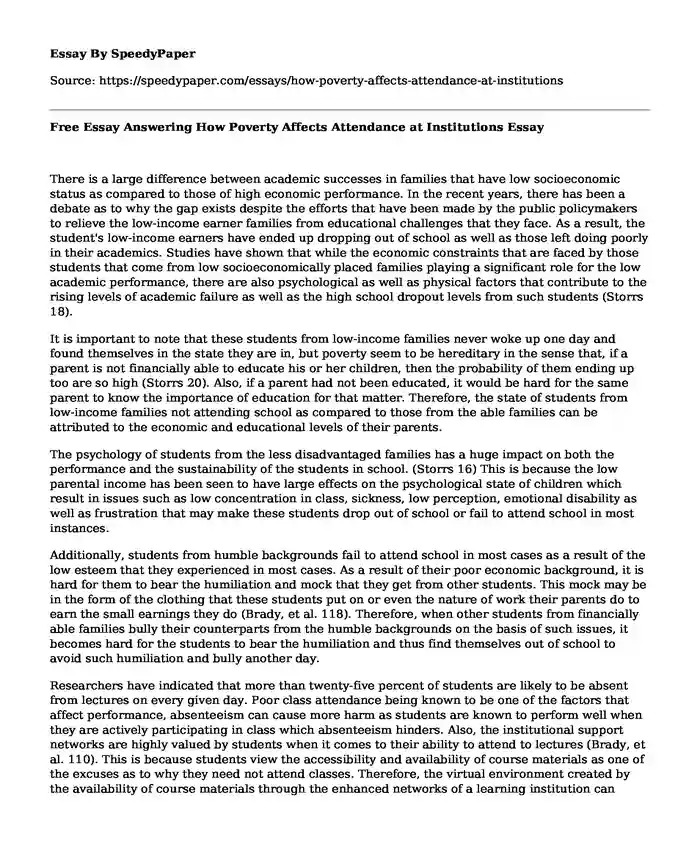There is a large difference between academic successes in families that have low socioeconomic status as compared to those of high economic performance. In the recent years, there has been a debate as to why the gap exists despite the efforts that have been made by the public policymakers to relieve the low-income earner families from educational challenges that they face. As a result, the student's low-income earners have ended up dropping out of school as well as those left doing poorly in their academics. Studies have shown that while the economic constraints that are faced by those students that come from low socioeconomically placed families playing a significant role for the low academic performance, there are also psychological as well as physical factors that contribute to the rising levels of academic failure as well as the high school dropout levels from such students (Storrs 18).
It is important to note that these students from low-income families never woke up one day and found themselves in the state they are in, but poverty seem to be hereditary in the sense that, if a parent is not financially able to educate his or her children, then the probability of them ending up too are so high (Storrs 20). Also, if a parent had not been educated, it would be hard for the same parent to know the importance of education for that matter. Therefore, the state of students from low-income families not attending school as compared to those from the able families can be attributed to the economic and educational levels of their parents.
The psychology of students from the less disadvantaged families has a huge impact on both the performance and the sustainability of the students in school. (Storrs 16) This is because the low parental income has been seen to have large effects on the psychological state of children which result in issues such as low concentration in class, sickness, low perception, emotional disability as well as frustration that may make these students drop out of school or fail to attend school in most instances.
Additionally, students from humble backgrounds fail to attend school in most cases as a result of the low esteem that they experienced in most cases. As a result of their poor economic background, it is hard for them to bear the humiliation and mock that they get from other students. This mock may be in the form of the clothing that these students put on or even the nature of work their parents do to earn the small earnings they do (Brady, et al. 118). Therefore, when other students from financially able families bully their counterparts from the humble backgrounds on the basis of such issues, it becomes hard for the students to bear the humiliation and thus find themselves out of school to avoid such humiliation and bully another day.
Researchers have indicated that more than twenty-five percent of students are likely to be absent from lectures on every given day. Poor class attendance being known to be one of the factors that affect performance, absenteeism can cause more harm as students are known to perform well when they are actively participating in class which absenteeism hinders. Also, the institutional support networks are highly valued by students when it comes to their ability to attend to lectures (Brady, et al. 110). This is because students view the accessibility and availability of course materials as one of the excuses as to why they need not attend classes. Therefore, the virtual environment created by the availability of course materials through the enhanced networks of a learning institution can cause high levels of absenteeism as most students enroll for courses with the notion that much face-face contact is not needed. In institutions where such content is not available or students cannot afford such as a result of their economic status then, their class attendance will not be possible and also won't be in the position to access the materials like their able counterparts.
Works Cited
Brady, David, et al. "How Politics and Institutions Shape Poverty and Inequality." Oxford Handbooks Online, 2017.
Storrs, Carina. "How poverty affects the brain." Nature, vol. 547, no. 7662, 2017, pp. 150-152.
Cite this page
Free Essay Answering How Poverty Affects Attendance at Institutions. (2022, May 18). Retrieved from https://speedypaper.net/essays/how-poverty-affects-attendance-at-institutions
Request Removal
If you are the original author of this essay and no longer wish to have it published on the SpeedyPaper website, please click below to request its removal:
- Free Essay Sample: Incident Action Plan
- Free Essay with a Case: New York Times V. United States
- Free Essay: Response to Ryan Bourne's Rampant Consumerism
- The Holocaust in the Film Night and Fog. Free Essay Sample.
- Finding Forrester - Movie Review Essay Sample
- Essay Sample: The Nausea Short Story by Jean-Paul Sartre
- Free Paper Example: United States Transition Between 1945 and 1960
Popular categories





